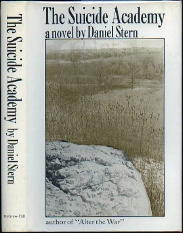Sat 27 Jan 2007
Obituary: DANIEL STERN (1928-2007).
Posted by Steve under Authors , Crime Fiction IV , Obituaries / Deaths NotedNo Comments
Here are the first few lines of the obituary article in yesterday’s New York Times for Daniel Stern:
I’ll get back to the coverage of Mr. Stern’s overall career in a minute, but among his other accomplishments, there’s one that makes him stand out from every other cellist who played with Charlie ‘Bird’ Parker, and that’s the fact that he also has an entry [one book] in Allen J. Hubin’s Crime Fiction IV:
* * *The Suicide Academy (McGraw, 1968, hc) Allen, 1969.

A blurb from the book itself says: “In The Suicide Academy Daniel Stern has taken a communal dream of our increasingly ordered times and turned it into a nightmare. Part spy story, part existential parable, this coldly brilliant novel makes for an unforgettable reading experience.”
About the book, the New York Times also goes on to say, and I quote:
From the descriptions so far – I haven’t read it, or I’d tell you more from a personal point of view – it appears to be a step beyond your usual book of crime and detection, if not two or three. To confirm this, here are some excerpts from a longer review, this one from Time magazine for September 20, 1968. It begins this way:
Outrageous subjects that were once shocking sources of satanic laughter now seem hardly ticklish at all. Black Comedians today tend to be admired like TV gagmen and nightclub acrobats – less for jolt than for sheer agility.
In that class, Daniel Stern, a critic-novelist (After the War, Miss America) long preoccupied with the dusty corners of the modern soul, proves a deft performer. His literary colleague Kurt Vonnegut recently toyed with industrialized suicide (Welcome to the Monkey House), but only as an example of the dehumanized modern world efficiently eliminating Malthusian excess. Stern’s Suicide Academy, by contrast, has a more promising metaphoric reach.
In Stern’s establishment, the clients come for one day only. With the aid of a scrupulously neutral staff, they are measured and examined. Between bouts of play and sleep, they study their own lives and the world, life wish and death wish together. Then comes calm choice — a return to the world or death, an end reached through a wide range of means provided by the management. Suicides, Stern observes, are the graduate students of the academy.
and it concludes:
Other accomplishments of Mr. Stern deserve a mention. Even though they’re outside the realm of crime fiction, they include:
● He was born on Jan. 18, 1928, and grew up on Manhattan’s Lower East Side and in the Bronx.
● He played the cello with Charlie Parker and the Indianapolis Symphony.
● He was a vice president at Warner Brothers Studios, CBS and the McCann-Erickson advertising firm.
● After nine novels, many of them well reviewed, Mr. Stern found his métier in the short story.
● At the time of his death, he was Cullen Distinguished Professor of English at the University of Houston.
● For Warner, he promoted the movie “Woodstock” with the line, “Nobody who was there will ever be the same. Be there.”